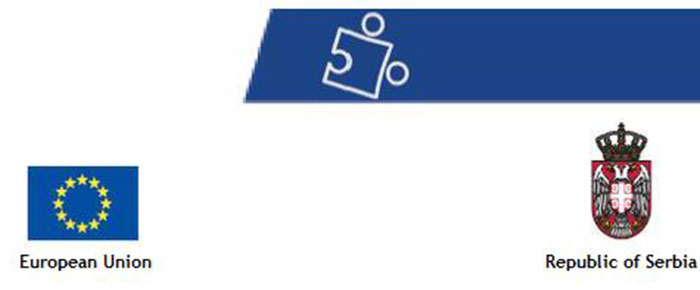
Local governments all over Serbia have a significant role to play in the ongoing country’s reforms and shaping of Serbia’s future. Being the closest to the citizens, they are at the very heart of democracy. Reforms made on the local level can be felt directly by the citizens and therefore, accountability in a decentralized manner towards them is crucial. Local governments are responsible for provision of many vital services for citizens and they are responsible for a huge share of investments in infrastructure and local utilities.
- Since the year of 2000, more than €350 million of EU funds has been specifically allocated to local government. Out of this sum, more than €20 million has been channelled only through Exchange programme, implemented by the Standing Conference of Towns and Municipalities, with an aim of facilitating the decentralization process, building capacity of LSGs and improving service delivery to citizens and businesses. Apart from direct financial support to municipalities to implement their priority projects, Exchange focused on strategic planning, fiscal decentralization and capacity building. Through EU Exchange 4 programme, EU works directly with over 70 LSGs units, helping them to implement reforms and improve service delivery to citizens in the areas that are crucial for local economic development and EU integration process. €4.5 million of EU grants has been allocated to 32 municipal projects for better property management, environment, social welfare and rural development.
- Ongoing EU Exchange 4 programme is designed and implemented in such a way to contribute to aligning priorities between the national and local level, and enforcing sector policies. The Programme aims at enforcing national policies across sectors which are important for public sector reforms (public finance/programme budgeting, strategic planning and property management), EU integration process (environment protection and waste management), and overall local socioeconomic development (agriculture and social welfare).
- Support to property management priority is addressing some of the keys challenges in implementing the Law on Public Property adopted in 2011. The grant scheme addresses the property management process, as essential condition for investment and overall local economic development, raising the competitiveness of the local economy and the quality of the business environment. 32 LSGs units, (including some of the big cities like Novi Sad, Nis, Kragujevac, Pozarevac) are currently working on resolving property issues.
- In area of environment, the EU is supporting sustainability of already established regional waste schemes (Duboko, Srem, Macva and Pirot), by establishing the system of the primary waste separation in 15 participating LSGs leading to reduction of amount of deposited waste to regional landfill, controlling number of wild dumps and amounts of waste by supporting public awareness and education of citizens. In 2014, 6 LSGs that have established systems of primary waste separation; the number of households covered with the primary separation have increased by 30 %.
- Exchange is addressing the needs of the elderly population through improvement of the home care service delivery at local level. In total 18 LSGs are working on improving standards for sustainable homecare service delivery, licencing and accreditation of the service providers. The number of home care users have doubled in small and underdeveloped municipalities like Zabari and Zagubica but also in the rural areas (66% of home care users are from rural population). The number of homecare givers (geronto domacice) has increased by 72% comparing to previous year (2013). LSGs have increased up to 50% of their budgets for social care and support to elderly comparing to 2014.
As the part of public finance reforms, the EU is supporting LSGs to better plan and spend their own resources on the one side, but also to raise funds for its capital infrastructure projects through alternative mechanism for financing, development of municipal bonds market as the most favourable way of borrowing. The Town of Sabac is the first local government to European Union Republic of Serbia issue its bonds through public placement in total amount of RSD 400 million (€3,32 million), thus allowing their bonds to be purchased by all domestic and foreign natural persons and legal entities. This represents a huge success for local economy, as it provides far lower interest rate compared to the bank loan, and much better duration structure set by the town not the creditor, ensures bonds open access for a broadest possible investor base (domestic/foreign including citizens), and finally ensuring all necessary conditions for investing in priority infrastructure project.
Reform of public administration and LSG is the most important aspect of EU integration process- development of legislative framework, but also its adequate enforcement, especially focusing on the EU Acquis, where more than 70% of legislations are responsibility of local governments. EU will continue supporting reforms; future support will focus enforcing legislations, especially those that are crucial for EU integration process (e.g. Law on Public Property), public finance reforms and improvement of transparency and accountability of planning and spending public budgets.
- Local governments all over Serbia have a significant role to play in the ongoing country’s reforms and shaping of Serbia’s future. Being the closest to the citizens, they are at the very heart of democracy; they provide many vital services for citizens and are responsible for a huge share of investments in infrastructure and local utilities. These investments can have significantly strengthen the overall economy.
- Since the year of 2000, more than €350 million of EU funds has been specifically allocated to local governments. Out of this sum, more than €20 million has been channeled only through Exchange programme, implemented by the Standing Conference of Towns and Municipalities, with an aim of facilitating the decentralization process, building capacity of LSGs and improving service delivery to citizens and businesses. Through this programme, the EU works directly with over 70 LSGs units.
Ongoing EU Exchange 4 programme is designed and implemented in such a way to contribute to aligning priorities between the national and local level, and enforcing sector policies. The Programme aims at enforcing national policies across sectors which are important for public sector reforms (public finance/programme budgeting, strategic planning and property management), EU integration process (environment protection and waste management), and overall local socioeconomic development (agriculture and social welfare).
As the part of public finance reforms, the EU is supporting LSGs to better plan and spend their own resources on the one side, but also to raise funds for its capital infrastructure projects through alternative mechanism for financing, development of municipal bonds market as the most favourable way of borrowing. The Town of Sabac is the first local government that issued its bonds through public placement in total amount of RSD 400 million (€3,32 million), thus allowing their bonds to be purchased by all domestic and foreign natural persons and legal entities.
– EU will continue supporting reforms of having in mind that number of reforms that will be taking place in coming years will be at local level and responsibility of local administrations. Future support will focus enforcing legislations, especially those that are crucial for EU integration process (e.g. Law on Public Property), public finance reforms and improvement of transparency and accountability of planning and spending public budgets.
For more information:
Delegation of the EU to the Republic of Serbia
Tel: +381 (0)11 30 83 200
delegation-serbia@eeas.europa.eu

